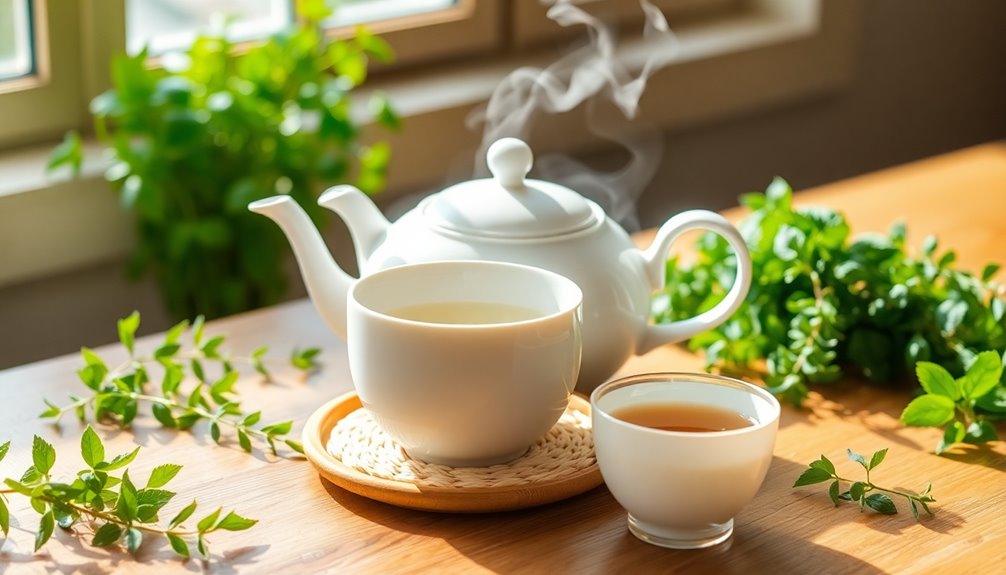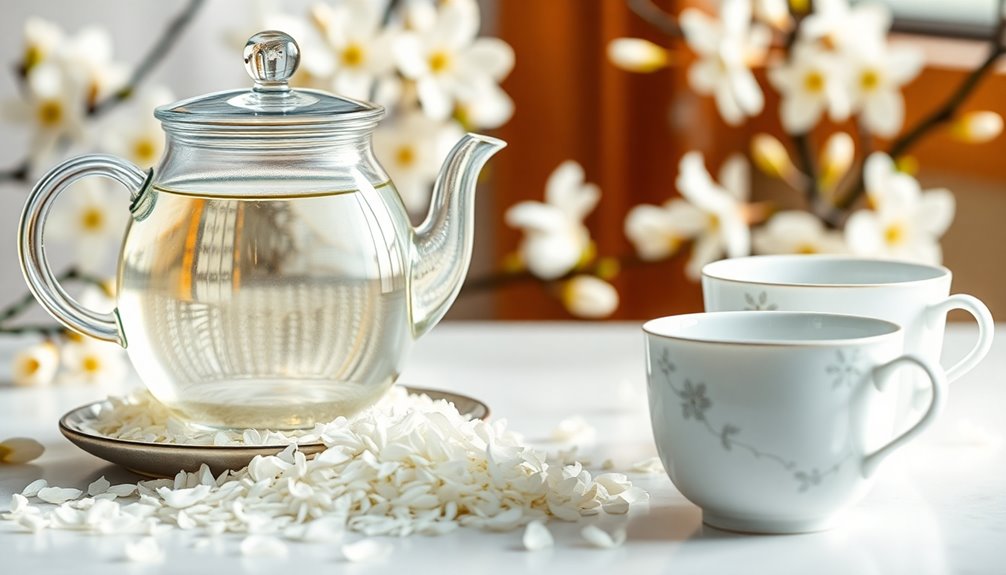White tea offers amazing health benefits that you might not know about! It's the least processed tea, packed with antioxidants that help fight free radicals. This can lower your risk of heart disease by up to 21%. Plus, white tea can improve your memory and mental clarity, helping you stay sharp as you age. It's also great for your teeth, thanks to its catechins that strengthen enamel and reduce plaque. With lower caffeine levels, it's gentler if you're sensitive. If you enjoy its unique flavor and numerous perks, there's even more to discover about this delightful beverage!
Key Takeaways
- White tea is rich in antioxidants, reducing oxidative damage and lowering the risk of chronic diseases like heart disease and diabetes.
- The special polyphenol EGCG in white tea may protect against neurodegenerative diseases and support cognitive health.
- Regular consumption of white tea can enhance memory function and mental clarity, beneficial for age-related cognitive decline.
- White tea promotes oral health by strengthening tooth enamel, suppressing bacteria, and providing anti-inflammatory benefits for gums.
- With lower caffeine content, white tea is gentler on sensitive individuals and can be enjoyed without adverse effects.
Introduction

White tea embodies the essence of health and wellness, making it a popular choice among tea enthusiasts. This unique tea comes from the Camellia sinensis plant and is the least processed of all teas. Because of this gentle processing, white tea is loaded with antioxidants, including polyphenols and catechins, which offer amazing health benefits.
When you sip white tea regularly, you might lower your risk of heart disease by up to 21%. This happens because it helps improve cholesterol levels and blood vessel function.
Plus, the special polyphenol called EGCG may protect your brain from neurodegenerative diseases like Alzheimer's and Parkinson's by reducing inflammation and preventing protein misfolding.
If you're worried about caffeine, white tea is a great option since it has lower levels compared to other teas. It's also low in calories, making it a smart choice for weight management. Additionally, incorporating fiber-rich foods like chia seeds into your diet can further enhance your digestive health and overall wellness.
Rich in Antioxidants and Polyphenols

When it comes to health benefits, the richness of antioxidants and polyphenols in white tea stands out. These powerful compounds help protect your cells from oxidative damage caused by free radicals.
When you drink white tea, you get antioxidants that work hard to fight inflammation and reduce the risk of chronic conditions, like heart disease and cancer.
Research shows that sipping white tea regularly can lower your risk of heart disease by 21%. This happens because the antioxidants in white tea combat oxidative stress, which is harmful to your cardiovascular health.
Plus, the polyphenols in this tea can also help reduce inflammation in your skin cells, making your skin look healthier and more vibrant.
In addition to supporting your heart and skin, the high levels of antioxidants in white tea boost your overall wellness. They may help lower the chances of developing chronic conditions, such as diabetes.
May Improve Memory Function

Sip on white tea, and you might just give your brain a boost. This delightful drink is packed with antioxidants and polyphenols, which can help improve memory function and support cognitive health.
Regularly drinking white tea may protect your brain from age-related memory decline and enhance your overall mental abilities.
Studies show that the polyphenols in white tea can boost your working memory and overall mental performance. By reducing oxidative stress in your brain cells, white tea may lower your risk of neurodegenerative diseases, keeping your mind sharp as you age.
Imagine enjoying a warm cup of white tea while feeling your mental clarity and focus improve. Not only does this beverage taste great, but it also contributes to better memory retention.
So, if you're looking for an easy way to support your brain health, consider making white tea a part of your daily routine.
Whether you sip it in the morning to kickstart your day or enjoy it in the afternoon for a refreshing pick-me-up, white tea can be a tasty ally in your journey toward better cognitive health. Cheers to a sharper mind!
Supports Oral Health Benefits

Oral health is often overlooked, but incorporating white tea into your routine can provide significant benefits for your teeth and gums. Drinking white tea is an easy way to boost your oral hygiene. It's rich in catechins and fluoride, which help strengthen your tooth enamel and reduce the risk of cavities. That means fewer trips to the dentist!
Regularly sipping white tea can also suppress the growth of bacteria that cause plaque. This leads to better oral hygiene and can significantly reduce plaque formation.
The polyphenols found in white tea have amazing anti-inflammatory properties, which can support your gum health and lower the chances of gum diseases.
Moreover, the antioxidant properties of white tea protect against oxidative stress that can lead to various dental issues. So, not only does it taste great, but it also works wonders for your dental health.
Caffeine Sensitivity in Some Individuals

For those sensitive to caffeine, white tea offers a gentler alternative compared to black or green teas. With lower caffeine levels, typically ranging from 30 to 50 mg per cup, you can enjoy its health benefits without worrying too much about caffeine sensitivity.
Many individuals experience symptoms like insomnia, anxiety, and restlessness when they consume too much caffeine. That's why monitoring your intake is essential.
The recommended daily caffeine intake for most adults is below 400 mg, and with white tea, you can easily stay within this limit, especially when consumed in moderation.
However, even the lower caffeine content in white tea might affect some sensitive individuals more than others, so it's vital to be cautious.
If you have caffeine sensitivity, it's a good idea to consult with a healthcare professional. They can help you determine the best amount of tea for your needs, ensuring you avoid potential adverse effects.
Practical Applications

If you're mindful of caffeine intake, incorporating white tea into your daily routine can bring numerous health advantages.
Start by steeping loose leaves or high-quality tea bags in water that's between 160-185°F (70-85°C) for 4-5 minutes. This helps you preserve white tea's delicate flavors while enjoying its amazing antioxidant properties. Air purifiers can also help maintain a healthy environment, complementing the health benefits of white tea by reducing airborne pollutants. Studies have shown that antioxidants found in tea, including white tea, can help combat oxidative stress, promoting overall health. In fact, the global demand for organic tea is increasing due to its perceived health benefits and commitment to sustainability.
Aim for 2-3 cups of white tea each day to lower your risk of heart disease by 21%. Drinking it before meals can also help reduce sugar cravings, which may boost your metabolism and assist in weight management.
For skin health, consider using white tea extract in your skincare routine. Research shows it provides UV protection and reduces the effects of skin aging, thanks to its anti-inflammatory properties.
To enhance your digestive health, sip on white tea after meals. It can help ease stomach discomfort and improve nutrient absorption. Additionally, herbal teas like chamomile and peppermint can also support digestion and relaxation.
Frequently Asked Questions
What Are Some Fun Facts About White Tea?
Did you know white tea's made from delicate young leaves and buds? It's the least processed tea, often prized for its subtle flavor. Plus, it has lower caffeine and a higher antioxidant content than other teas!
What Does White Tea Do for Your Stomach?
White tea soothes your stomach by promoting healthy digestion and alleviating discomfort. Its gentle properties help prevent constipation and reduce nausea, making it a great choice for those with sensitive stomachs looking for relief.
What Is the Best Time to Drink White Tea?
The best time to drink white tea is in the morning or early afternoon. It gives you a gentle boost in alertness, helps with digestion after meals, and curbs sugar cravings later in the day.
Does White Tea Help Hair Growth?
Yes, white tea can help hair growth. Its antioxidants combat oxidative stress, while catechins promote blood circulation to your scalp. Regularly drinking it may reduce inflammation, creating a healthier environment for your hair to flourish.
Conclusion
So, why not give white tea a try? With its amazing antioxidants and potential benefits for your memory and oral health, it's a tasty choice. Just remember, if you're sensitive to caffeine, keep an eye on how much you drink. You can easily enjoy this delightful tea daily or use it in fun recipes. Embrace the goodness of white tea, and you might just feel the difference in your health! Cheers to that!










